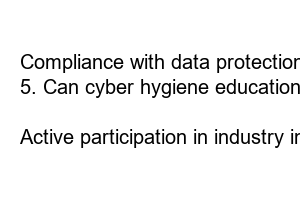세탁업 사이버 위생교육
Title: Enhancing Cyber Hygiene Education in the Laundry Industry
Introduction:
In today’s digital age, ensuring cyber hygiene is crucial for all industries, including the laundry sector. The increasing reliance on technology brings with it potential vulnerabilities that hackers can exploit. This blog post aims to shed light on the importance of cyber hygiene education within the laundry industry, and how it can safeguard businesses and their customers from cyber threats.
1. Understanding Cyber Hygiene in the Laundry Industry:
Maintaining good cyber hygiene involves implementing practices and protocols to safeguard data, systems, and networks. In the laundry industry, where technology plays a significant role, cyber hygiene education is essential to foster a secure digital environment for businesses and consumers alike.
2. Identifying Threats and Vulnerabilities:
Awareness of potential cyber threats allows the laundry industry to proactively address vulnerabilities. By prioritizing cyber hygiene education, businesses can identify and mitigate risks, such as data breaches, ransomware attacks, or unauthorized access to sensitive information.
3. Importance of Regular Employee Training:
Developing a culture of cyber hygiene starts with educating employees. Regular training sessions equip staff with the necessary knowledge to detect and report potential security breaches, protect passwords, identify phishing emails, and handle sensitive data securely.
4. Implementing Robust Cybersecurity Measures:
A comprehensive cybersecurity strategy is vital to combat the evolving nature of cyber threats. It includes measures like installing firewall protection, regular software updates, encryption techniques, strong authentication protocols, and secure data backups. By educating laundry industry professionals on these practices, businesses can fortify their defenses against potential cyber-attacks.
5. Compliance with Data Protection Regulations:
Cyber hygiene education also includes fostering compliance with data protection regulations, such as the General Data Protection Regulation (GDPR) or the California Consumer Privacy Act (CCPA). Educating employees on legal obligations ensures that personal and sensitive data is handled in accordance with applicable laws, reducing the risk of penalties and reputational damage.
6. Collaboration and Industry Efforts:
To combat cyber threats effectively, collaboration between industry players, associations, and authorities is vital. By sharing best practices, insights, and experiences, the laundry industry can collectively enhance cybersecurity measures. This collaboration can also address emerging threats, create industry-wide standards, and implement joint educational initiatives.
Summary:
With the increasing reliance on technology, cyber hygiene education is crucial for the laundry industry to protect against potential cyber threats. By understanding the importance of cybersecurity, identifying vulnerabilities, providing regular employee training, implementing robust security measures, ensuring compliance with data protection regulations, and fostering collaboration, the industry can significantly enhance its cyber hygiene practices. So, let’s join forces in prioritizing cyber hygiene and safeguarding the laundry industry’s digital landscape.
FAQs:
1. How often should employees undergo cyber hygiene training?
Regular training sessions should be conducted annually or whenever there are significant updates in cybersecurity threats and practices.
2. What are some common signs of a phishing email?
Phishing emails often display suspicious attachments, unknown senders, urgent requests for personal information, or misspelled domain names. Alertness and proper cybersecurity education help identify and report such emails.
3. How does encryption contribute to cyber hygiene?
Encryption techniques convert data into a form that can only be accessed with an authorized key. Implementing encryption adds an extra layer of security to protect sensitive information from unauthorized access.
4. What role does compliance play in cyber hygiene?
Compliance with data protection regulations ensures that businesses handle personal and sensitive data responsibly, reducing the risk of data breaches and associated legal consequences.
5. Can cyber hygiene education completely eliminate cyber threats?
While cyber hygiene education mitigates risks, it cannot completely eliminate cyber threats. However, it significantly reduces vulnerabilities and equips individuals to detect and respond to potential breaches effectively.
6. How can laundry industry professionals contribute to collective cybersecurity efforts?
Active participation in industry initiatives, sharing best practices, and reporting any cyber incidents to relevant authorities and industry associations contribute to strengthening cybersecurity measures collectively.

